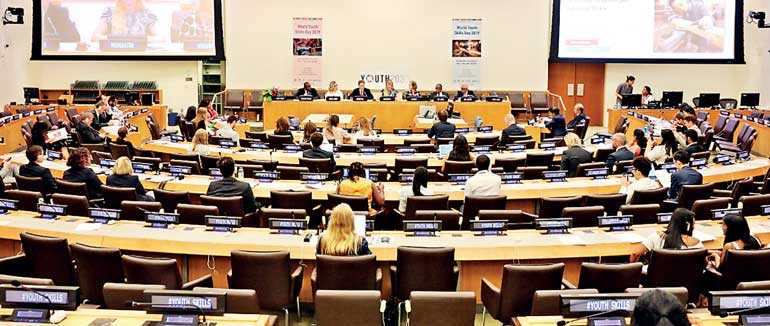Thursday Feb 26, 2026
Thursday Feb 26, 2026
Monday, 5 August 2019 00:00 - - {{hitsCtrl.values.hits}}


The United Nations General Assembly adopted a resolution in 2014, declaring 15July as “World Youth Skills Day” which will be celebrated every year.
World Youth Skills Day 2019 was marked on 15 July at the UN Headquarters at New York, organised by the Permanent Mission of Sri Lanka to the UN, Permanent Mission of Portugal to the UN, Office of the Secretary General’s Envoy on Youth, UNESCO and ILO, and spearheaded by Sri Lanka.
Learning to learn
The theme of the event was ‘Learning to Learn for Life and Work’. The objective of the event was to discuss ‘Learning to Learn’ in the future of work and in the age of technological innovation, social and demographic transformations and climate change threats. The lifelong learning perspective was considered as the central focus of the 2030 agenda for sustainable development. Under the leadership and direction ofPrime Minister Ranil Wickremesinghe, and in his capacity as the Minister on the subject of Youth Affairs, the Ministry initiated national-level programmatic interventions through the National Youth Corps and National Youth Services Council (NYSC).
The Sustainable Development Goal (SDG) 4 in particular pays special attention on inclusive and equitable quality education and promoting lifelong learning opportunities for all. Technical and vocational education and skills development was considered as an essential building block for inclusive development and decent work. Technical and vocational education and skills development is perceived as a necessity for people at all ages and of all socio-economic backgrounds. Further digital technology offers an array of opportunities to learn anytime anywhere. Therefore, it was noted that it is a necessity to inspire young people to develop a passion for learning skills and to pursue excellence.

More than 150 participants from the Government sector, UN agencies, private sector, academia, representative of the civil societies and youth organisation attended this event,co-chaired by the Permanent Representative of Portugal, Francisco Antonio Duarte Lopes and Charge d’ Affairesof Sri LankaSatya Rodrigo. The event discussed that the skills, knowledge, vocational training and education of youth are essential to manage planet, service delivery, peace, partnerships, prosperity, and to achieve sustainable development.
UN General Assembly President Maria Fernanda Espinosa, Under Secretary GeneralAna Maria Menendez, UNESCO Director General Audrey Azoulay, ILO Director General Guy Ryder, and UN Secretary-General’s Envoy on Youth JayathmaWickremanayake, were present at the event.
Technical and vocational skills
The Ministry ofNational Policies, Economic Affairs, Resettlement and Rehabilitation, Northern Province Development and Youth Affairs, which comes under the direct purview of Prime MinisterRanil Wickremesinghe, is mandated to empower the youth community, said MinistrySecretaryV. Sivagnanasothy, delivering the Statement representing the Youth Affairs Ministry of the Government of Sri Lanka. The Ministry engaged in interactive dialogue,and the following key aspects were discussed: